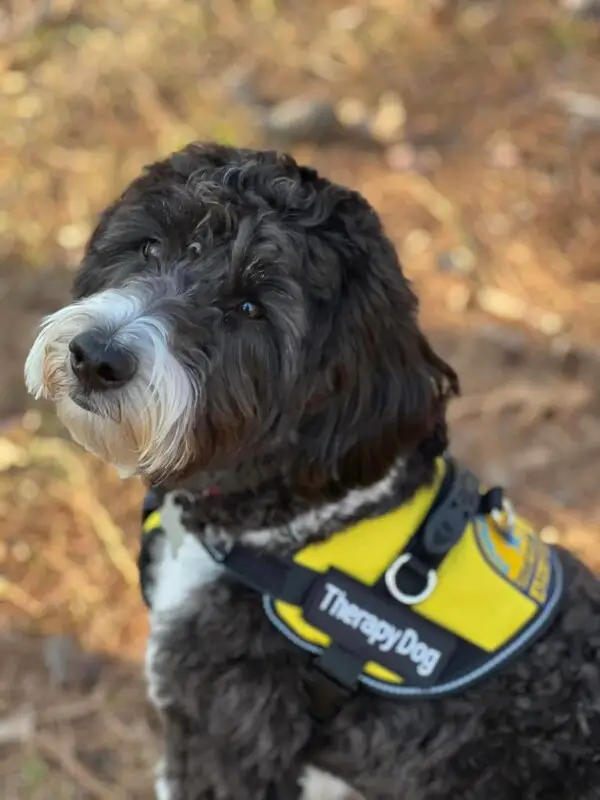Four-legged, fluffy, bright eyed, and sporting a yellow Arkansas Baptist Disaster Relief (ABDR) harness, Quigley could be found at Balboa Baptist Church over the weekend comforting volunteers and survivors.
The Aussiedoodle is the first therapy dog in ABDR history. He and his owner, Deb Norris, who has volunteered with ABDR for several years, had their first deployment together on Saturday following the EF-2 tornado that touched down in Hot Springs Village on Thursday.
ABDR teams were deployed to the area through Sunday and primarily spent time clearing streets to help provide better access for first responders to get to homes and for electric companies to restore power. The storm was isolated but devastating to the area it hit. There were no major injuries or deaths.
For his first deployment, Norris said Quigley did very well.
“We weren’t there for a long time, probably four or five hours,” Norris said, noting Quigley visited with disaster relief volunteers as well as one survivor couple she spoke with for an extended period.
“He tucked in beside me and laid still while we had meetings and talked. He responded perfectly for that situation,” said Norris, who recently completed her ABDR chaplaincy training.
Norris and her husband got Quigley, now two years old, when he was a puppy. After their last dog died, they had initially decided they were not going to get another one. That only lasted for about a year and half, Norris said. During that time, Norris began getting more involved with ABDR.
“I knew when my husband and I started talking about getting another dog, from the get-go, I knew that I would like to choose a breed that would be suitable and have an aptitude to work with me in disaster relief,” she said.
A therapy dog is one that might be trained to provide affection, comfort, and love to those in hospitals, retirement homes, nursing homes, schools, hospices, disaster areas and to those with anxiety disorders or autism. Norris frequently takes Quigley to visit Mount Carmel Retirement Community in Benton, assisted living facilities and hospice patients.
“There’s lots of medical information out there that supports the value of having therapy dogs in stressful situations for people,” Norris said. According to a 2022 Alliance of Therapy Dogs article, interacting with therapy dogs lowers cortisol, a stress hormone, and enhances the body’s natural stress-reduction chemical oxytocin release.
While researching therapy dogs in relation to disaster relief, Norris found only two other instances in Southern Baptist life. One of those is Schimmel, a German Shepherd who in 2022 became the first training dog in Kentucky Disaster Relief history.
Quigley has his AKC Canine Good Citizen certification and is aligned with Alliance of Therapy Dogs, an international registry of certified therapy dog teams. The group provides testing, certification, registration, support, and insurance for members who volunteer with their dogs in animal-assisted activities.
Soon, Norris hopes to get Quigley certified as a crisis response dog through Hope AACR (Animal-Assisted Crisis Response), a national crisis response dog organization. The mission of Hope AACR is to “provide comfort and encouragement through animal-assisted support to individuals affected by crises and disasters.”
“To do that, [the dogs] have a pretty intense qualification and Quigley has just now gotten to a point where he is eligible to try for that,” she said.
Hope AACR website states certified teams are required to go through specialized training such as: crisis intervention skills (emotional first aid), animal behavior and stress management, critical incident stress management, incident command system training, first aid and CPR, and pet first aid, to name a few.
First, Quigley must pass a three-hour screening, scheduled for April 27 in Dallas. If that goes well, he and Norris must then attend an intense three-day training in June.

